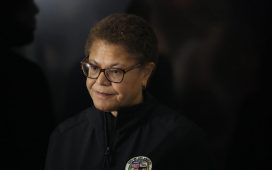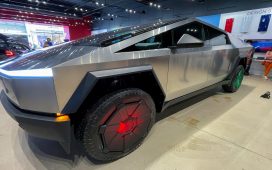2017 Chrysler Pacifica BraunAbility is on display at the 109th Annual Chicago Auto Show at McCormick Place in Chicago, Illinois on February 9, 2017.
Raymond Boyd | Getty Images
Fiat Chrysler’s (FCA) proposed 50/50 merger with Renault could pave the way for a long-awaited M&A (merger and acquisition) boom in the sector, analysts have told CNBC.
The tie-up looks to strengthen FCA’s position in electric vehicle technologies but would also create the third largest global automaker by production, behind Volkswagen and Toyota.
It’s been lauded by many analysts, including Philippe Houchois, autos equity research analyst at Jefferies, who published in a note that there is nothing to dislike in a proposed merger that offers scope for synergies and restructuring.
“(It’s) hard to disagree with the logic (of the deal) and with net synergies. We are positive on both shares with proforma combination still at low end of sector,” Houchois said.
Gaetan Toulemonde, autos equity research analyst at Deutsche Bank, said in a note that it would allow both groups to share platforms and “capture economies of scale at a time when the industry needs to invest massively in CO2 reduction (and) autonomous driving.”
The auto industry has long promised consolidation but has never fully delivered on market expectations. Now, under mounting pressure from structural changes including new technologies and stricter emissions standards, we could finally be on the brink of an M&A bonanza in the sector.
“There is certainly scope for a lot of co-operation throughout the industry, either through a full merger such as Renault-FCA or just sharing R&D or sourcing,” said Anna-Marie Baisden, Head of Autos, Macro Research at Fitch Solutions.
And Arndt Ellinghorst, the head of global automotive research at investment banking firm Evercore ISI, told CNBC he “wouldn’t rule anything out at this stage as we know from public statements that various players are open to consolidation.”
Daimler and BMW recently struck an agreement to pool their mobility services to create a new global player providing sustainable urban mobility for customers. They have also joined forces on autonomous driving. If they are forced to compete with another mega automaker in FCA-Renault, Daimler and BMW could perhaps even explore deepening their ties.
“The recent FCA-Renault announcement confirms that the auto industry is changing and that cooperation will be one of the keys for future success. We are monitoring the next steps closely and certainly see the possibility that the merger can also create opportunities and potentials,” wrote a Daimler spokesperson in an email to CNBC.
Angus Tweedie, auto equity research analyst at Citi agrees that closer collaboration between Daimler and BMW would seem very logical given their similar target markets and therefore commonality of components. Areas of difficulty would be the shareholder structure and there also seems some opposition at both companies from an operational perspective. Like all European deals, headcount reductions would be difficult, Tweedie added.
Ford and Volkswagen have already forged a global alliance to develop commercial vans and medium-sized pickups together and have signed a memorandum of understanding to investigate collaboration on autonomous vehicles, mobility services and electric vehicles and have started to explore opportunities.
On the prospect of a bigger deal down the line for the two giants, Fitch’s Baisden said there was appealing logic.
“Their strategies both focus on EVs and autonomy in the medium to long term and so with a challenging market that threatens their income, it would make sense.”
And don’t forget about Peugeot. Multiple reports suggest the French carmaker was interested in doing a deal with Fiat Chrysler. If FCA consummates this deal with Renault, Peugeot will have to look elsewhere for merger opportunities.
Some market participants suggest a tie-up between Peugeot and Jaguar Land Rover (JLR) could make sense.
“I can see how JLR would be an appealing partner in giving PSA exposure to the premium segment and also the US, which it is looking to return to,” said Baisden.
JLR has been struggling recently, posting losses in the first three quarters of 2017 before swinging to a small profit in the final quarter of the year. Further, PSA’s chief Carlos Tavares has successfully turned around the Opel Vauxhall brand he bought from General Motors in 2017, demonstrating his ability to restructure and integrate new businesses.
Ellinghorst also wouldn’t rule out Peugeot coming back for FCA: “They have shown interest in FCA before. (But) we must see how Renault and the French government reacts first.”
The European auto sector rallied on the back of FCA’s proposal to merge with Renault earlier this week. Market watchers highlight that the positive share price moves show how undervalued carmakers are.
“There has been talk of consolidation for years. Now at the peak of the cycle, the market welcomes the fact that there is some action with regards to consolidation,” Ellinghorst told CNBC.
Peugeot and BMW did not respond to CNBC’s request for comment.








